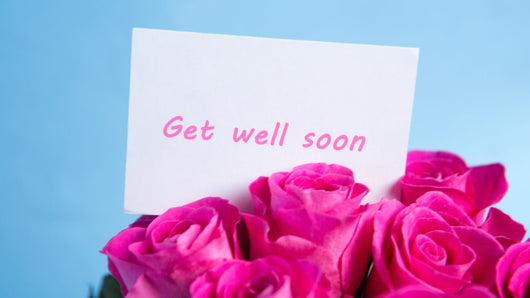
When a loved one is feeling under the weather, a beautiful bouquet of get-well flowers can lift their spirits and brighten their day. Flowers have the power to bring comfort, positivity, and warmth to someone recovering from an illness or surgery. But choosing the perfect arrangement isn’t just about picking the prettiest blooms—there are a few key factors to consider, such as flower meanings, allergies, hospital policies, and more.
In this guide, we’ll walk you through everything you need to know to select the perfect get-well flowers for your friend, family member, or colleague.
1. The Importance of Sending Get-Well Flowers
Flowers aren’t just beautiful—they offer psychological and emotional benefits that can aid recovery. Studies show that fresh flowers can:
-
Reduce stress and anxiety
-
Boost mood and positivity
-
Promote relaxation and comfort
-
Improve overall well-being
A thoughtfully chosen floral arrangement can serve as a visual reminder that your loved one is cared for, loved, and supported.
2. Best Types of Flowers for a Get-Well Bouquet
Not all flowers are ideal for get-well gifts. Some blooms have specific meanings that make them particularly fitting for someone recovering. Here are some of the best options:
Bright and Cheerful Flowers
-
Sunflowers – Symbolize warmth, happiness, and strength
-
Daisies – Represent purity, innocence, and hope
-
Gerbera Daisies – Known for their vibrant colors and uplifting energy
Soothing and Comforting Flowers
-
Lavender – Promotes relaxation and reduces stress
-
Peonies – Symbolize healing and good fortune
-
Lilies – Represent renewal and encouragement
Low-Allergen and Fragrant-Free Flowers
If the recipient is in a hospital or has allergies, consider hypoallergenic flowers such as:
-
Orchids
-
Hydrangeas
-
Tulips
-
Roses (without strong fragrances)
Avoid highly fragrant flowers like lilies or gardenias, as they might be overwhelming in enclosed spaces.
3. Choosing Flowers Based on the Recipient’s Preferences
Before selecting a bouquet, think about the recipient’s personal preferences:
-
Favorite Colors – A bouquet in their favorite shade can be extra meaningful.
-
Personal Style – Do they love elegant, classic flowers or wild, garden-style blooms?
-
Favorite Flowers – If they have a known favorite flower, include it in the arrangement.
A personalized touch makes the bouquet feel more thoughtful and special.
4. Hospital vs. Home Delivery: What to Consider
If your loved one is in a hospital or care facility, there are a few important things to keep in mind:
Hospital Flower Delivery Tips
-
Check hospital policies. Some hospitals have restrictions on fresh flowers in intensive care units (ICUs) due to infection risks.
-
Choose a small, compact arrangement. Space is often limited, so avoid overly large bouquets.
-
Opt for a sturdy vase. This prevents spills in a hospital room.
-
Avoid pollen-heavy flowers. Some patients or healthcare workers may have allergies.
Sending Flowers to Their Home
If the recipient is recovering at home, you have more flexibility:
-
Choose a larger bouquet or a potted plant that lasts longer.
-
Add a heartfelt card or a small gift like a box of tea or a scented candle.
-
Consider easy-care flowers that don’t require too much maintenance.
5. Pairing Flowers with Thoughtful Additions
To make your get-well gift even more meaningful, consider adding:
-
A handwritten card – A simple message of encouragement can go a long way.
-
Tea or honey – Great for soothing sore throats and boosting immunity.
-
A small book or magazine – Something lighthearted to keep them entertained.
-
A cozy blanket or socks – Comforting gifts to help with recovery.
Adding a little extra thought to your flower gift shows how much you care.
6. Best Get-Well Plants for Long-Lasting Cheer
If you want a gift that lasts longer than cut flowers, consider sending a potted plant. Some great options include:
-
Peace Lily – Easy to care for and symbolizes healing and tranquility.
-
Succulents – Low-maintenance and perfect for brightening up a bedside table.
-
Aloe Vera – Known for its healing properties and air-purifying benefits.
-
Herb Plants (e.g., lavender or mint) – Provide a soothing aroma and can be used for teas or cooking.
Plants are a wonderful alternative for those who appreciate greenery and longevity.
7. Flowers to Avoid for Get-Well Gifts
While most flowers make excellent get-well gifts, some should be avoided:
-
Strongly Fragrant Flowers – Lilies, jasmine, and gardenias can be overpowering, especially in hospitals.
-
Flowers with Excess Pollen – Sunflowers and daisies may trigger allergies.
-
Dark or Somber Colors – Deep red or purple blooms can sometimes carry unintended meanings.
Stick with bright, cheerful, and light-scented flowers to keep the mood uplifting.
8. Ordering and Delivering Get-Well Flowers
Where to Buy Get-Well Flowers
-
Local Florists – They can create custom arrangements and provide same-day delivery.
-
Online Flower Shops – Many offer convenient delivery services and a wide selection.
-
Grocery Stores – A budget-friendly option if you want to hand-deliver the flowers yourself.
Delivery Tips
-
Make sure the recipient will be home or available to receive the flowers.
-
Double-check the delivery address for accuracy.
-
Include a thoughtful message with the arrangement.
Conclusion
Choosing the perfect get-well flowers is about more than just aesthetics—it’s about sending a message of love, encouragement, and support. Whether you opt for a cheerful bouquet, a soothing arrangement, or a long-lasting plant, your thoughtful gesture will undoubtedly brighten the recipient’s day and help them on the path to recovery.
So next time you want to lift someone’s spirits, remember these tips and select a floral gift that truly makes a difference.